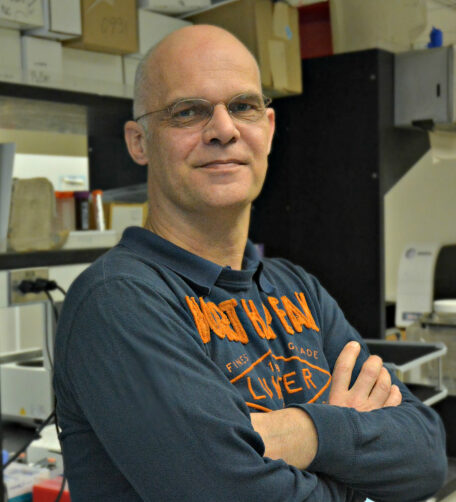Research labs in the Division of Nephrology:

Feng Chen, PhD
“Our laboratory studies the genetic determinants and pathogenic mechanisms of kidney diseases and cancer with the goal of improving diagnostic and therapeutic strategies targeting these diseases. We are an interdisciplinary team combining experimental biology and computational analyses to advance precision medicine.”

Ying Maggie Chen, MD, PhD
“A major focus of our lab is to investigate the molecular pathogenesis of organelle stress-mediated kidney diseases, to discover endoplasmic reticulum (ER) stress biomarkers, and to develop highly-targeted therapies by employing high-throughput drug screening. Another focus is renal angiogenesis and fibrosis.”

Leslie Gewin, MD
“Our laboratory is interested in the pathophysiology of renal injury and tubulointerstitial fibrosis, with a specific interest in tubule epithelial injury. Our group is focused on understanding how growth factors, particularly the TGF-beta and Wnt/beta-catenin pathways, modulate the epithelial response to injury.”
Follow on X @LeslieGewin

Andreas Herrlich, MD, PhD
“Research in the Herrlich Lab aims to define new therapies for the treatment or prevention of kidney disease. We investigate the regulation and release of growth factors and their receptors in kidney disease using mouse models of acute kidney injury and chronic kidney disease as well as cell culture models.”
Follow on X @HerrlichLab

Benjamin Humphreys, MD, PhD
“Our laboratory is developing new and innovative treatments to help patients with kidney disease. We are using human stem cells to generate kidney organoids to model development & disease. We study the kidney’s ability to regenerate itself so that we can harness this ability for therapeutic uses, and we use single cell technologies to drive precision medicine.”
Follow on X @HumphreysLab

Sanjay Jain, MD, PhD
“Our mission is to understand development and diseases of the urogenital and nervous systems. We aim to fill critical gaps in the field and create new knowledge to accelerate path to early diagnoses, management and treatment of the diseases of the genitourinary system.
“A central theme of the lab is to understand the biology of the kidney and lower urinary tract stem cells with particular emphasis on their potential to form diverse cell type and their ability to maintain homeostasis in healthy and disease states in adults.”

Moe Mahjoub, PhD
“The goal of our research is to understand how two important cellular organelles, the centrosome and cilium, organize signaling pathways that influence diverse cellular functions.
“These highly conserved organelles are involved in regulation of cell-cycle progression, cell differentiation, polarity, and migration. Defects in the structure and function of centrosomes and cilia lead to a range of human disease conditions known collectively as ‘Ciliopathies.'”
Follow on X @MahjoubLab

Jeffrey Miner, PhD, FASN
“The main interest of my laboratory is the role of the glomerular basement membrane (GBM) in kidney function and disease. Several genetic and acquired diseases of the kidney affect the GBM, causing thinning or thickening.
“We focus on the laminin (LAMB2) and type IV collagen (COL4A3/A4/A5) components of the GBM that are mutated in Pierson syndrome (a congenital nephrotic syndrome) and Alport syndrome (hereditary glomerulonephritis), respectively.”
Follow on X @JeffMinerPhD

Michael Rauchman, MDCM
“The main goal of our research is to investigate gene regulation during kidney development and disease. We apply this knowledge to understand birth defects of the kidney and to develop treatments that promote repair and regeneration of the kidney in disease states.”

Naoka Murakami, MD, PhD
“Our research focuses on understanding the mechanism of autoimmune kidney diseases and kidney transplant rejection associated with cancer immunotherapies, using animal models and patient samples, with eventual goal to identify potential therapeutic targets.”
Follow on X @nymurakami